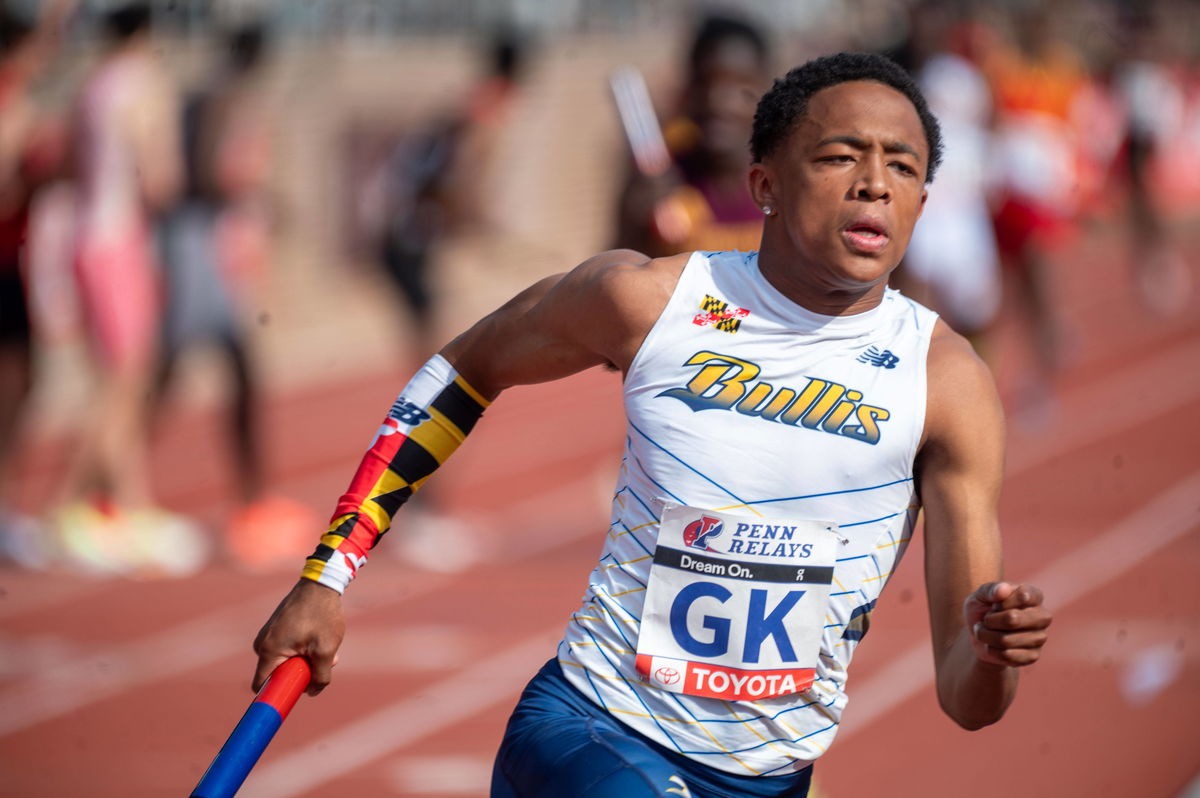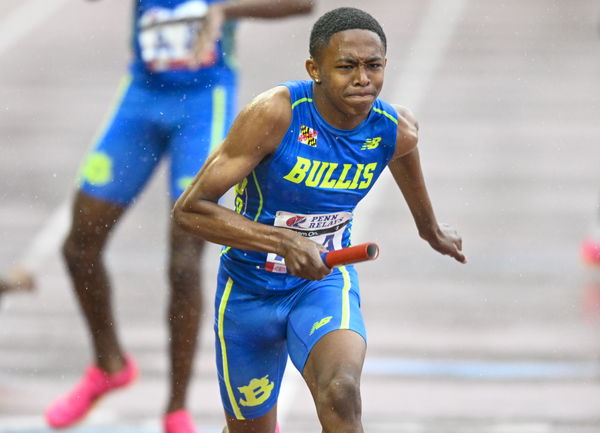
Imago
April 24, 2025, Philadelphia, Pennsylvania, United States: Olympic Gold Medalist QUINCY WILSON running the 4×400 relay on day one of the Penn Relays at the historic Franklin Field in Philadelphia PA Philadelphia United States – ZUMArf1_ 20250424_zaf_rf1_008 Copyright: xRickyxFitchettx

Imago
April 24, 2025, Philadelphia, Pennsylvania, United States: Olympic Gold Medalist QUINCY WILSON running the 4×400 relay on day one of the Penn Relays at the historic Franklin Field in Philadelphia PA Philadelphia United States – ZUMArf1_ 20250424_zaf_rf1_008 Copyright: xRickyxFitchettx
At just 17 years of age, Quincy Wilson is already reshaping the boundaries of what is expected from a high school athlete. Competing against seasoned professionals at the USATF Outdoor Championships, the Bullis School athlete did more than just show up; he challenged, contended, and came painfully close to securing a spot in the 400m final. While his 45.39 in Heat 2 wasn’t enough to advance, it marked another milestone in a season already defined by a historic 44.10 at the Ed Murphey Classic. That, along with his Olympic relay gold from Paris, has elevated Wilson from prodigy to legitimate contender.
Watch What’s Trending Now!
But what happened in Eugene wasn’t merely about times or placements. It became a referendum on belief, particularly for those who had publicly questioned whether Wilson was ready to make the U.S. team. Among them was former Olympic champion Justin Gatlin, who had initially left Wilson off his projected roster. It was a decision that, by his own admission, he quickly came to regret.
ADVERTISEMENT
“While you looking for yours, all I can say is sentiment got in my way, man. You know what I mean?” Gatlin remarked in conversation with Rodney Green on their Ready Set Go podcast’s episode, which premiered on August 5. “I love seeing the dynamic of Quincy Wilson, and also love seeing him interact with Vernon Norwood. So, I was like, man, it’ll be great… But when you do these kind of predictions, which I hate doing… it’s just the fact of you got to go teeter towards people you know that either can get the job done or you’re familiar with,” added Gatlin.
Gatlin’s reluctance wasn’t born of skepticism about Wilson’s talent, but from the challenge of weighing sentiment against strategy. “That’s why I picked it,” he explained. “I knew better. But here I am, man. About to be standing at the 400-meter line.” His shift in tone highlights just how persuasive Wilson’s presence has become, even among track veterans who understand the rigors of elite competition. The young sprinter may not have clinched a finals berth in Eugene, but his trajectory has already forced former champions to rethink their metrics for greatness.
ADVERTISEMENT
Wilson’s race in Heat 2 placed him fourth, just behind a tightly contested field led by Vernon Norwood, who clocked 44.78. He was edged out at the line by Khaleb McRae, another rising star, whose finish sealed his first world team appearance. “He nipped Quincy right at the line,” Green observed. “Let’s shout them out. First, second, and third.”
ADVERTISEMENT
As Wilson returns to the Bullis School for his senior year, the lessons from this summer extend far beyond the stopwatch. While that’s that, before grabbing his berth on the national team, Wilson also made another impeccable record just a few weeks back.
Quincy Wilson rewrites history with blistering 44.10 in 400 meters
Quincy Wilson’s stride in Memphis was not merely swift; it was historically consequential. The 17-year-old from Maryland, already familiar with the weight of expectation, lowered his own world under-18 best in the 400 meters to 44.10 seconds at the Ed Murphey Classic. This performance, executed without visible strain, situated him among the top four quarter-milers globally for the current season and narrowed the distance between his youth record and the longstanding world under-20 mark of 43.87 seconds.
ADVERTISEMENT

Imago
PHILADELPHIA, PA – APRIL 28: Bullis freshman Quincy Wilson anchors the 4x400m relay during the 127th running of the Penn Relays at Franklin Field on April 28, 2023. (Photo by Jonathan Newton/The Washington Post)
Following the race, Wilson offered a succinct reflection on what had brought him to this juncture. He stated, “Staying to my coach’s plan and trusting his process.” His season, measured and consistent, has demonstrated a clear upward progression. From his 45.37-second title run at New Balance Nationals to his extraordinary 43.99 relay split at the Penn Relays, Wilson has gradually shifted from promising talent to present force. He speaks with awareness not only of his responsibilities on the track, but of the evolving public role that now trails him: “I feel like when it comes with being who I am, the fame and everything has gone up and escalated.”
ADVERTISEMENT
Wilson’s approach has betrayed no relaxation. There was precision in his movement and composure in his response to both praise and provocation. “You’ll have the goods and you’ll have the bad. But those are the things that make Quincy Wilson,” he remarked. With the U.S. Championships approaching, his results suggest a readiness for deeper tests, ones that may draw him even closer to the most enduring records in the event’s history.
ADVERTISEMENT
ADVERTISEMENT
ADVERTISEMENT